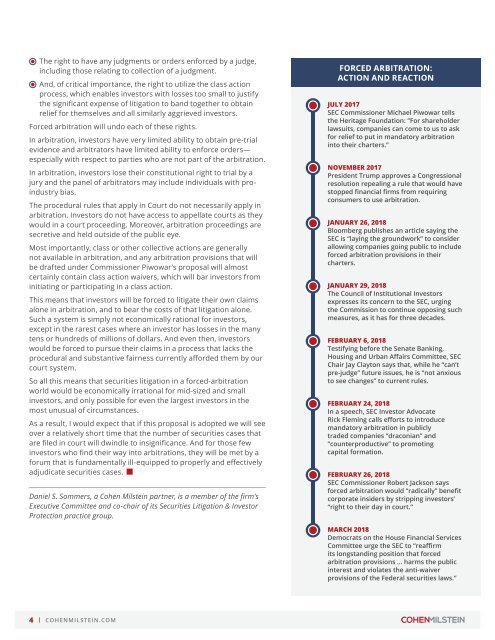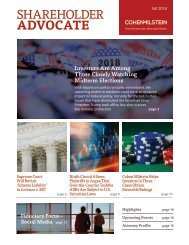Shareholder Advocate Spring 2018
Create successful ePaper yourself
Turn your PDF publications into a flip-book with our unique Google optimized e-Paper software.
The right to have any judgments or orders enforced by a judge,<br />
including those relating to collection of a judgment.<br />
And, of critical importance, the right to utilize the class action<br />
process, which enables investors with losses too small to justify<br />
the significant expense of litigation to band together to obtain<br />
relief for themselves and all similarly aggrieved investors.<br />
Forced arbitration will undo each of these rights.<br />
In arbitration, investors have very limited ability to obtain pre-trial<br />
evidence and arbitrators have limited ability to enforce orders—<br />
especially with respect to parties who are not part of the arbitration.<br />
In arbitration, investors lose their constitutional right to trial by a<br />
jury and the panel of arbitrators may include individuals with proindustry<br />
bias.<br />
The procedural rules that apply in Court do not necessarily apply in<br />
arbitration. Investors do not have access to appellate courts as they<br />
would in a court proceeding. Moreover, arbitration proceedings are<br />
secretive and held outside of the public eye.<br />
Most importantly, class or other collective actions are generally<br />
not available in arbitration, and any arbitration provisions that will<br />
be drafted under Commissioner Piwowar’s proposal will almost<br />
certainly contain class action waivers, which will bar investors from<br />
initiating or participating in a class action.<br />
This means that investors will be forced to litigate their own claims<br />
alone in arbitration, and to bear the costs of that litigation alone.<br />
Such a system is simply not economically rational for investors,<br />
except in the rarest cases where an investor has losses in the many<br />
tens or hundreds of millions of dollars. And even then, investors<br />
would be forced to pursue their claims in a process that lacks the<br />
procedural and substantive fairness currently afforded them by our<br />
court system.<br />
So all this means that securities litigation in a forced-arbitration<br />
world would be economically irrational for mid-sized and small<br />
investors, and only possible for even the largest investors in the<br />
most unusual of circumstances.<br />
As a result, I would expect that if this proposal is adopted we will see<br />
over a relatively short time that the number of securities cases that<br />
are filed in court will dwindle to insignificance. And for those few<br />
investors who find their way into arbitrations, they will be met by a<br />
forum that is fundamentally ill-equipped to properly and effectively<br />
adjudicate securities cases.<br />
Daniel S. Sommers, a Cohen Milstein partner, is a member of the firm’s<br />
Executive Committee and co-chair of its Securities Litigation & Investor<br />
Protection practice group.<br />
FORCED ARBITRATION:<br />
ACTION AND REACTION<br />
JULY 2017<br />
SEC Commissioner Michael Piwowar tells<br />
the Heritage Foundation: “For shareholder<br />
lawsuits, companies can come to us to ask<br />
for relief to put in mandatory arbitration<br />
into their charters.”<br />
NOVEMBER 2017<br />
President Trump approves a Congressional<br />
resolution repealing a rule that would have<br />
stopped financial firms from requiring<br />
consumers to use arbitration.<br />
JANUARY 26, <strong>2018</strong><br />
Bloomberg publishes an article saying the<br />
SEC is “laying the groundwork” to consider<br />
allowing companies going public to include<br />
forced arbitration provisions in their<br />
charters.<br />
JANUARY 29, <strong>2018</strong><br />
The Council of Institutional Investors<br />
expresses its concern to the SEC, urging<br />
the Commission to continue opposing such<br />
measures, as it has for three decades.<br />
FEBRUARY 6, <strong>2018</strong><br />
Testifying before the Senate Banking,<br />
Housing and Urban Affairs Committee, SEC<br />
Chair Jay Clayton says that, while he “can’t<br />
pre-judge” future issues, he is “not anxious<br />
to see changes” to current rules.<br />
FEBRUARY 24, <strong>2018</strong><br />
In a speech, SEC Investor <strong>Advocate</strong><br />
Rick Fleming calls efforts to introduce<br />
mandatory arbitration in publicly<br />
traded companies “draconian” and<br />
“counterproductive” to promoting<br />
capital formation.<br />
FEBRUARY 26, <strong>2018</strong><br />
SEC Commissioner Robert Jackson says<br />
forced arbitration would “radically” benefit<br />
corporate insiders by stripping investors’<br />
“right to their day in court.”<br />
MARCH <strong>2018</strong><br />
Democrats on the House Financial Services<br />
Committee urge the SEC to “reaffirm<br />
its longstanding position that forced<br />
arbitration provisions … harms the public<br />
interest and violates the anti-waiver<br />
provisions of the Federal securities laws.”<br />
4 I COHENMILSTEIN.COM



